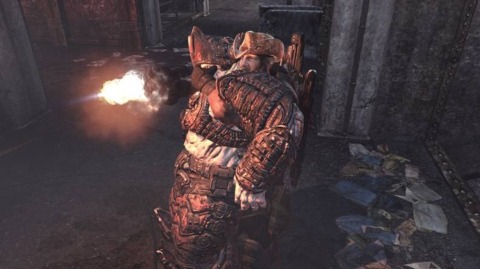GDC 2009: Killing the Gears of War 2 deadline
Epic Games' Rod Fergusson describes how the best-selling shooter was made in just two years and how fixed release dates can help developers make tough decisions; Franchise growth tips also on tap.
Last year's Xbox 360 hit Gears of War 2 landed less than two years after the original. That impressive feat is even more remarkable when you consider that Epic Games was simultaneously working on the PC version of the first Gears as well as downloadable content.
Although some might have balked at having to ship a AAA game under such a tight schedule, Epic executive producer Rod Fergusson embraced the deadline. In a 2009 Game Developers Conference presentation yesterday, he said that setting a firm date helped shape some of the key creative decisions behind the game--and kept his team laser-focused.
But even before the release date was fixed internally at Epic, Fergusson said that the team approached development on Gears of War 2 with a "versioning" mindset. That is, the sequel would build on the strengths of the first and not necessarily add any massive, game-changing features.
"We knew what our core was, and we just wanted to start building on top of that," he said. "If you were to look at GTAIV or Metal Gear Solid, and then say 'I want all of the features in all those games,' the chances of you doing that are almost zero. You have to be careful not to get too much stuff on your plate. Every feature you put in is essentially stealing polish time from the other features. Potentially, the more features you add, the bigger the chance of you lowering the overall quality of your product."
Fergusson said that, after setting the deadline internally, all decisions were then framed against meeting that schedule. "This provides a clear goal for the team, and it forces prioritization and creativity. If I said you only had two years, you damn well better be working on the most important thing first because you might run out of time," he explained.
"It's the belief that this ship date you have is both realistic and achievable. And then you say let's hold the date like it can't be changed. Our plan is to hold it as steady as we can and allow that to drive our resources."
Another key method that Epic used to keep game development in focus was setting thematic pillars. For Gears 2, Fergusson said that the pillars were a grander scale, more intimate moments, and accessibility. New features were then added to the game only if they supported one of these pillars. For example, the narrative involving Dom's wife was added for intimacy, as was the whole mechanic of using injured Locusts as meat shields. "After all, what's more intimate than a meat shield?" Fergusson quipped.
Although some ideas or concepts won't make the cut because of their incompatibility with the game's thematic pillars, Fergusson said that these shouldn't necessarily be abandoned completely. "Doing that allows you to put ideas in the sequel bank. You don't just throw them away--you put them aside," he said.
Got a news tip or want to contact us directly? Email news@gamespot.com

Join the conversation